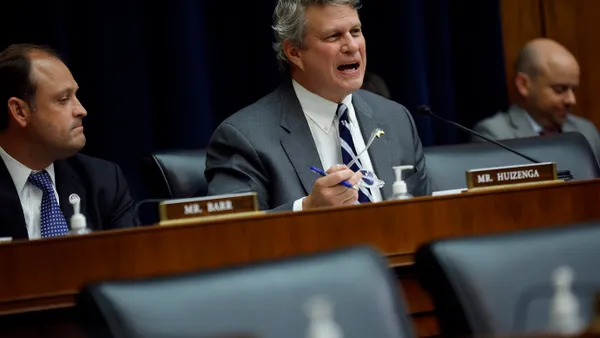Dive Brief:
- Mastercard has agreed to acquire the cybersecurity company Recorded Future for $2.65 billion from the venture capital firm Insight Partners, according to a joint press release issued Thursday.
- Boston-based Recorded Future services about 1,900 business and government clients in some 75 countries, the release said. The companies expect the transaction to be completed by the first quarter of next year, pending regulatory review and other closing conditions.
- The card network already collaborates with Recorded Future on an artificial intelligence service that alerts banks when a credit or debit card has likely been compromised. Since the launch of that service earlier this year, the rate of spotting those problematic situations has increased, according to the release.
Dive Insight:
Cybersecurity has become increasingly important in the age of digital payments for all companies operating in the ecosystem. Identity theft, imposter scams and online hacks have made safeguarding customers’ credit and debit card credentials more difficult and more critical.
“As a technology company in the global payments industry entrusted with the safeguarding of sensitive information (including personal information), cybersecurity risk management is an integral part of our overall enterprise risk management program,” Mastercard said in its annual filing with the Securities and Exchange Commission.
While Mastercard has cybersecurity oversight needs for its cards and payments businesses, it also sells cybersecurity services to other companies, including banks and fintechs. Analysts who follow the card network expect the Recorded Future purchase will buttress its business.
“We see the Recorded Future deal bolstering Mastercard’s competitive advantage,” analysts at the financial firm William Blair wrote in a note to their clients on Thursday. Mastercard’s larger rival, Visa, also spends billions or dollars annually on cybersecurity efforts.
Mastercard has acquired cybersecurity firms in the past. Last year, it acquired the Swedish cyber defense company Baffin Bay; it also bought RiskRecon in 2019; and the AI cyber software company Brighterion in 2017. The purchase of Recorded Future will build on its cybersecurity AI development.
“Both Mastercard and Recorded Future use AI to analyze billions of data points to identify potential threats, helping to protect people and businesses,” the release said. “Bringing these teams, technology and expertise together will enable the development of even more robust practices and drive greater synergies in cybersecurity and intelligence.”
This week, Mastercard CEO Michael Miebach mentioned providing such services to London-based neobank and fintech Revolut during a presentation at a Goldman Sachs investors conference. He also referenced how the card network is using AI to enhance its cybersecurity services during the conference.
“We have recently launched a set of AI-driven solutions around our cybersecurity offerings where we use generative AI to predict what is the next likely defrauded card number,” he said. “That sounds a little wonky, but that can actually be done.”
Mastercard is paying a “significant premium” on a $780 million valuation for Recorded Future when it was purchased by Insight Partners in 2019, the William Blair analysts noted. Recorded Future has about $300 million in annual revenue and 1,000 employees, according to its website.
The fintech is led by CEO and co-founder Christopher Ahlberg, who has been with the company since its inception in 2007. Tech giant Google’s venture arm and the venture capital firm In-Q-Tel were early investors in the company in 2009, according to Record Future’s website.
"We will remain an independent and open intelligence platform, operating as an independent subsidiary of Mastercard," Ahlberg said on his LinkedIn page.
A Mastercard spokesperson didn’t immediately have a comment on how many Recorded Future employees would be retained in the merger. “We’re focused on building on the experience, expertise and strengths of the teams to innovate faster and help our customers spot potential cyber attacks before they happen,” the spokesperson said by email.











